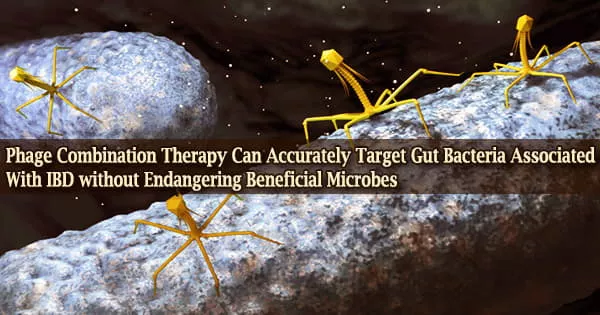The first phage combination therapy that can precisely target and reduce gut bacteria linked to inflammatory bowel diseases (IBD) has been developed by scientists. The research, which was published on August 4, 2022, in the journal Cell, illustrates the potential for employing phages to treat conditions linked to gut microbiota.
“The biggest problem with applying phage therapies is that there is a constant arms race between bacteria and phages,” says Eran Elinav, director of the Systems Immunology department, Weizmann Institute of Science and the Microbiome & Cancer Division, German National Cancer Center (DKFZ) and the corresponding author of the study.
“If you apply a single phage on a bacterium, the bacterium would likely develop resistance mechanisms very rapidly. To our knowledge, we are the first to use an orally-administered phage combination therapy against a disease-contributing gut commensal, while tackling the huge issue of phage resistance and treating a non-communicable disease.”
Millions of people across the world suffer from a variety of chronic inflammatory gastrointestinal illnesses known as IBD. Although the exact origin of IBD is still unknown, prior research has revealed that particular gut bacteria may be connected to the condition.
Antibiotics have been explored as a treatment for IBD, but they are not sufficiently specific or efficient. In addition to killing pathogenic bacteria in the gut, antibiotics can have negative side effects and breed bacteria that are resistant to them.
“This proof-of-concept study utilizes phages as a precision weapon in suppressing a group of commensal strains contributing to IBD,” says Elinav. “But our vision is that this new modality could potentially be developed and applied against a number of other IBD-associated bugs, and also against commensals that are involved with other diseases, including obesity, diabetes, cancer, neurodegenerative diseases, and more.”
Elinav’s team compared the gut microbiota compositions of 537 IBD patients to healthy controls enrolled in cohort studies in France, Israel, the U.S., and Germany. They did this in collaboration with a group of international scientists and the Weizmann Institute of Science’s spinoff phage therapy company, BiomX Ltd.
Despite variances in geography, ethnicity, and nutrition, the research team discovered that IBD patients often have an enriched gut population of certain Klebsiella pneumoniae (Kp) strains, particularly in individuals who are suffering flare-ups of their condition.
This proof-of-concept study utilizes phages as a precision weapon in suppressing a group of commensal strains contributing to IBD. But our vision is that this new modality could potentially be developed and applied against a number of other IBD-associated bugs, and also against commensals that are involved with other diseases, including obesity, diabetes, cancer, neurodegenerative diseases, and more.
Eran Elinav
The team discovered that mice who received the Kp had severe intestinal inflammation and tissue damage, indicating that certain Kp strains may be involved in the deterioration of IBD.
Thousands of bacteriophages were then scanned and isolated from environmental samples by Elinav and his team. Viral agents known as bacteriophages can target and infect bacteria. They discovered over 40 phages, including those with phage resistance, that seem to be efficient against the Kp viruses that contribute to IBD.
The scientists put the phages to the test against Kp strains that contribute to IBD in distinct groups. Each of the phages in these combinations enters bacteria through a different receptor and kills the cells using a different method.
There will be fallbacks, according to Elinav, even if the bacteria change and one of their receptors become resistant. He continues by saying that a potent cocktail formulation can stop phage-resistant bacteria from growing and dispersing.
The most effective phage cocktail, which has five phages, was developed by Elinav and his team to suppress the Kp strains in test tubes and in animals with IBD models, where the phage cocktail reduced tissue damage and inflammation.
Two sample phages from this mixture were then investigated further by the team in a phase I clinical trial with 18 healthy volunteers. The experiment demonstrated that when taken with antacids, phages can survive at high concentrations and remain active throughout the gastrointestinal tract without affecting the local microbiota.
Participants had no serious side effects from the treatment. In a future phase II experiment with IBD patients who had the disease-causing Kp strains, the team wants to test the 5-phage combo once more.
Additionally, Elinav and his group are aiming to find the bacteria linked to additional illnesses and create powerful phage combination medicines to combat them.
“What we envision is a precision medical pipeline,” says Elinav. “Using it, we can characterize the pathogenic bacteria of a person suffering from a disease related to the gut microbiota, and then apply a phage therapy that would be tailored to the individual to suppress the bacteria.”





